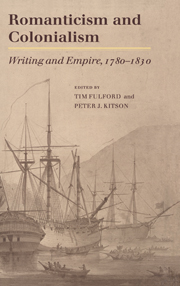Book contents
- Frontmatter
- Contents
- Notes on contributors
- Acknowledgements
- 1 Romanticism and colonialism: texts, contexts, issues
- 2 Romanticism and colonialism: races, places, peoples, 1785–1800
- 3 Romanticism and colonialism: races, places, peoples, 1800–1830
- 4 Accessing India: Orientalism, anti-‘Indianism’ and the rhetoric of Jones and Burke
- 5 ‘Sunshine and Shady Groves’: what Blake's ‘Little Black Boy’ learned from African writers
- 6 Blood Sugar
- 7 ‘Wisely forgetful’: Coleridge and the politics of Pantisocracy
- 8 Darkness visible? Race and representation in Bristol abolitionist poetry, 1770–1810
- 9 Fictional constructions of Liberated Africans: Mary Butt Sherwood
- 10 ‘Wandering through Eblis’; absorption and containment in Romantic exoticism
- 11 The Isle of Devils: The Jamaican journal of M. G. Lewis
- 12 Indian Jugglers: Hazlitt, Romantic Orientalism, and the difference of view
- 13 ‘Some samples of the finest Orientalism’: Byronic Philhellenism and proto-Zionism at the time of the Congress of Vienna
- 14 ‘Once did she hold the gorgeous East in fee…’: Byron's Venice and Oriental Empire
- 15 The plague of imperial desire: Montesquieu, Gibbon, Brougham, and Mary Shelley's The Last Man
- Index
7 - ‘Wisely forgetful’: Coleridge and the politics of Pantisocracy
Published online by Cambridge University Press: 20 August 2009
- Frontmatter
- Contents
- Notes on contributors
- Acknowledgements
- 1 Romanticism and colonialism: texts, contexts, issues
- 2 Romanticism and colonialism: races, places, peoples, 1785–1800
- 3 Romanticism and colonialism: races, places, peoples, 1800–1830
- 4 Accessing India: Orientalism, anti-‘Indianism’ and the rhetoric of Jones and Burke
- 5 ‘Sunshine and Shady Groves’: what Blake's ‘Little Black Boy’ learned from African writers
- 6 Blood Sugar
- 7 ‘Wisely forgetful’: Coleridge and the politics of Pantisocracy
- 8 Darkness visible? Race and representation in Bristol abolitionist poetry, 1770–1810
- 9 Fictional constructions of Liberated Africans: Mary Butt Sherwood
- 10 ‘Wandering through Eblis’; absorption and containment in Romantic exoticism
- 11 The Isle of Devils: The Jamaican journal of M. G. Lewis
- 12 Indian Jugglers: Hazlitt, Romantic Orientalism, and the difference of view
- 13 ‘Some samples of the finest Orientalism’: Byronic Philhellenism and proto-Zionism at the time of the Congress of Vienna
- 14 ‘Once did she hold the gorgeous East in fee…’: Byron's Venice and Oriental Empire
- 15 The plague of imperial desire: Montesquieu, Gibbon, Brougham, and Mary Shelley's The Last Man
- Index
Summary
During the summer of 1794, Robert Southey and Samuel Taylor Coleridge planned to establish an egalitarian community on the banks of the Susquehanna River in Pennsylvania. It was Coleridge who invented the name for this ideal community, ‘Pantisocracy’, meaning ‘government by all’. The historical origins of Pantisocracy have been thoroughly scrutinized by Coleridge scholars; an especially insightful, biographical overview is provided by Richard Holmes, who gives a sympathetic account of the project as a major intellectual enterprise that left Coleridge with an enduring sense of his political and poetic vocation. A more detailed historical perspective is afforded by Nicholas Roe, who elucidates the role of Pantisocracy within the intricate discourse of contemporary, radical politics. However, the intellectual significance of Pantisocracy within the larger context of British maritime exploration and the colonization of the New World has not been adequately examined.
This essay will discuss two previously unrecognized narrative sources for the Pantisocracy scheme: Edward Christian's pamphlet concerning the mutiny on the Bounty (1794) and George Keate's Account of the Pelew Islands (1788). Pantisocracy arises from an imaginary representation of America that assimilates it to the South Sea Islands, with their fabled luxuriance and remoteness from European politics. Coleridge was especially intrigued by the figure of Fletcher Christian, whose imaginary adventures he intended to write. Christian was regarded by many English radicals as a flawed, but noble, revolutionary hero, having led a bold mutiny against the tyrannical Captain Bligh and subsequently departed with his comrades on board the Bounty for a voyage of discovery and settlement in uncharted waters.
- Type
- Chapter
- Information
- Romanticism and ColonialismWriting and Empire, 1780–1830, pp. 107 - 128Publisher: Cambridge University PressPrint publication year: 1998
- 9
- Cited by



